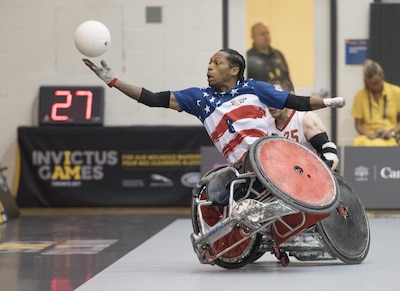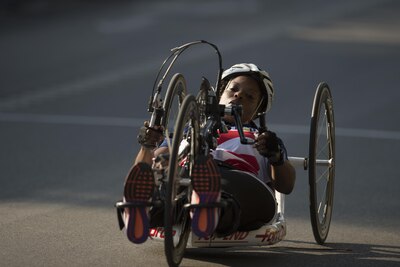By Shannon Collins DoD News, Defense Media Activity
TORONTO, Sept. 28, 2017 — Overturned wheelchairs, strong
blocking and speed scoring were showcased as national teams competed here at
the Mattamy Athletics Centre during preliminary matches leading to today’s
rugby semifinals at the 2017 Invictus Games.
The United Kingdom takes on Australia at 5 p.m. Eastern
Daylight Time, and then Denmark takes on the U.S. at 6 p.m. EDT to determine
who goes on to the bronze match at 8:15 p.m. EDT and the gold match at 9:15
p.m. EDT. The U.S. is the defending rugby champion from last year’s Invictus
Games.
“We’re looking to defend our title. We’re not giving
anything up. If a team wants it, they’ve got to come get it from us,” said
medically retired Marine Corps Sgt. Anthony McDaniel, U.S. rugby team captain.
“We have good communication and each other’s backs; picking each other up and
helping each other out. We’ve got a solid team. It’s all defense and then we just
execute on offense. It’s going to be a lot of fun for everybody.”
McDaniel said about half the team played in last year’s
game. “We’re balancing out the lineups. It’s working well,” he said. “The new
guys are listening to the guys who have been playing for a few years, putting
them in the right positions in order to put our team in the right position.”
McDaniel said communication is a key factor to the team’s
success. “Win, lose or draw, we stick together,” he said. “We always
communicate. We have each other’s back, and it’s a good group of guys, as
always. No matter who’s on the team, no matter what year, we always play well
together.”
The U.S. team lost its first pool match to the U.K., but
came back to win against France and Italy. The U.K. and Denmark went
undefeated. Australia won two of its matches but lost to Denmark.
U.K. Team
According to fans, other competitors and Danish rugby team
captain army Cpl. Mark Peters, the U.K.’s rugby team is favored to win. Stuart
Robinson, the U.K. rugby team captain and a medically retired British Army
corporal, said his team has been doing really well.
“The game against the U.S. was probably our hardest game. We
actually played pretty well and came away with a victory and then the next two
games, Italy and the Ontario [Canada] select team, again, both powerful
opposition, but we came away with good results,” he said. “We gelled together
as a team and got the cobwebs blown away.”
He said strength and depth on the squad is the U.K.’s
biggest strength. “We don’t rely on just one player. We’ve got a lot of
different players who can bring something else to the game and for them to come
on and perform in every single game that we’ve played, it just shows how strong
and deep our squad is,” he said.
Robinson said about half of his team competed last year at
Invictus in Orlando, Florida, and three members also competed at the first
Invictus Games in London in 2014.
“We’ve got a bit of experience but it’s always good to bring
new blood in and give them a bit of opportunity to compete, as well,” he said.
The U.K. has a strong offense, Robinson said but other teams
shouldn’t discount its defense. “We’re quite optimistic about our chances but
the semifinal will be a tough game, and we’re not counting our chickens, just
yet,” he said. “We are looking forward to playing and hopefully coming away
with a victory.”
Like the U.S. team, the U.K. team has a strong team ethos,
Robinson said. “We’re military; we’re all from the same background,” he said.
“We all have that same team ethos where we work together and look out for one
another. The teamwork is just amazing. We’ve been together now for about 12
months. We’ve bonded quite well and for us to come out here and compete on such
a large stage, we can show just how together we are.”
Denmark
Peters is confident about his team’s chances.
“We played pretty well. We had a plan and executed the plans
almost perfectly,” he said. “We knew what we were going to play and how we were
going to play it. We weren’t sure what Australia would do but we knew if we
played our game, we would have a good chance of beating them, and we did.”
The Denmark team’s biggest strength is its speed, Peters
said. “We have tremendous speed all around,” he said. “We also have good
stamina. So if we can just maintain our speed, the other team is going to get
tired.”
Last year, Denmark took the silver medal against the U.S. at
the Invictus Games. Denmark faces off again with the U.S. in the semifinals.
“Every year, the U.S. looks strong, but I’ve been watching
the U.K. and they are strong,” Peters said. “They’re probably the favorites to
win this. We’re going to have fun and try to go as far as we can. These three
games were a lot of fun for us. Everybody is almost placed equally all the way
around so it’s perfect. We have a good lineup.”
Camaraderie
Camaraderie among the competing teams “is amazing,” Robinson
said. “We’re all from a military background and we all compete on such a
massive stage. We’re all here for the same reason,” he said.
“Even before the competition, as soon as we get here, we’re
looking for people from other countries that we met from years prior because
you build those relationships so quick,” McDaniel said. “Even though we’ve won
against each other, we’re always cheering each other on, all of the countries.
We want to see everyone do well.”
He added, “Invictus is a place where anything’s possible.
We’re all going through things but if you can come out here, even if you could
just watch it, you can see that anything’s possible. There are so many people
here with so many different types of disabilities but you see them giving their
all with a smile on their face and everybody cheering them on, picking them up.
It’s an extended family throughout all of the other countries. We’re all here
for each other.”










